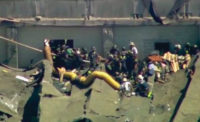A fourth person has died because of an explosion and fire at German chemical giant BASF’s Ludwigshafen headquarters, as company officials slowly get operations running again and an official investigation moves forward as to whether a maintenance contractor cut a pipeline by mistake. Three BASF firefighters and a Polish sailor died and several others were injured as a result of the Oct. 17 explosion along a riverside loading dock in Ludwigshafen, in south-central Germany across the Rhein river from the city of Mannheim.
BASF company spokeswoman Sabrina van der Pütten says the company is giving no further updates yet about the contractor or its past safety record.
Two BASF steamcrackers, which are complex systems that break down crude-oil-distilled material into the source elements for plastics, shut down in the wake of the explosion. One has since restarted, van der Pütten says, and the other is in process of coming back on line. Ethylene and propylene chains also were either idled or operated at reduced capacity after the accident.
Company officials and the attorney general’s office of the state of Rheinland-Pfalz, where Ludwigshafen is located, have traced the fire and explosion to a pipeline accidentally cut during maintenance work nearby the river loading site. Van der Pütten says that, according preliminary evaluations, the theoretical chain of events is that a butylene mixture escaped from the severed pipeline and was ignited by sparks from a nearby angle grinder in use. The resulting fire would have caused the explosion.
BASF says the drop in production resulting from the accident is costing as much as 10% to 15% in daily volume of its own manufactured products, which translates to perhaps €2 million to €3 million ($2.2 million to $3.3 million) in lost sales per day, though this figure is volatile and will change once the firm ramps up back to normal production.
“We’re going to continue to support the relevant authorities during the investigation into the cause of the accident,” van der Pütten says. “In coming weeks, the remaining plants which were idled or where production was reduced will be restarted.”




